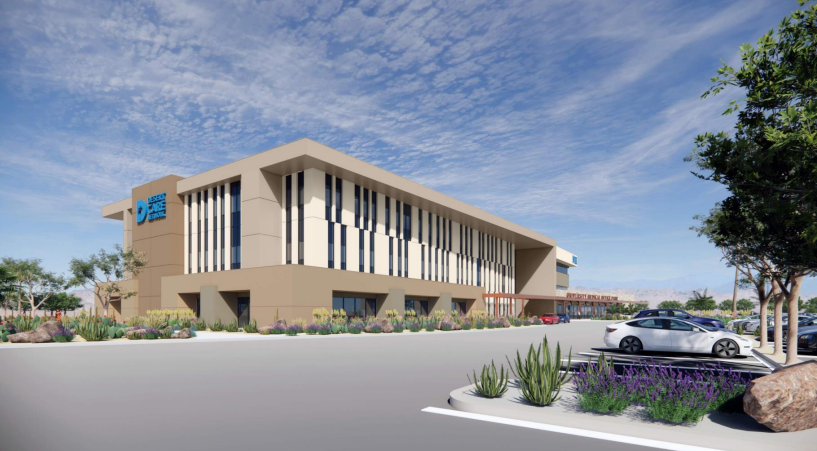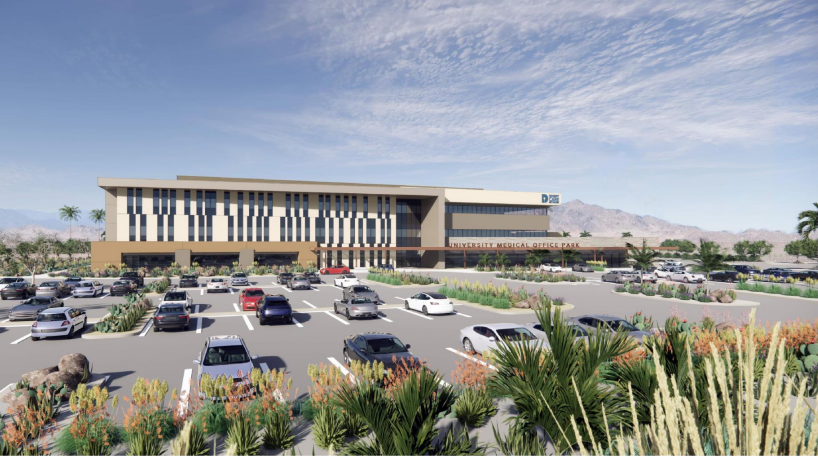Major new medical campus could be ‘one-stop shop’ for healthcare in north Palm Desert

A large campus of medical offices intended to serve as a “one-stop shop” for many healthcare services will soon be built in the growing area of north Palm Desert.
The city council approved a detailed plan and environmental assessment last week for the development of a 10.47-acre property located at the southwest corner of Gerald Ford Drive and Technology Drive. The council also agreed Thursday to amend its specific plan for the “University Park” area to allow zoning for medical offices.
The proposal submitted by Desert Care Network and Tenet Healthcare will be built in two phases. The first is slated to include the main three-story medical office building, along with 474 parking spaces, three access roads and a turn lane along Gerald Ford Drive.
The proposal for the 114,700-square-foot medical office park did not receive any opposition from residents of the area, where hundreds of new homes and apartments are planned, during the city's community outreach process.
However, it drew pushback Thursday from local labor representatives, who asked the city to mandate the project be built by union workers. Attorneys representing regional construction unions also argued the project was out of compliance with the California Environmental Quality Act, but city planners disagreed and said the existing environmental analysis was adequate.
What's in the project?
Along with the three-story medical office building in the project’s first phase, the second phase calls for another one-story, 20,000-square-foot building, along with an additional 100 parking spaces.
While it won’t include a hospital or any overnight services, the medical campus will still have lots to offer. Linda Evans, La Quinta’s mayor, spoke to the Palm Desert council Thursday in her day job as the chief strategy officer of community advocacy for the Desert Care Network. Evans said the campus will be “kind of a one-stop shop” for many services.
“It won't be entirely Desert Care Network,” Evans told the council. “We are also engaging private physicians. We’ll have laboratory services, an imaging center, pharmacy, rehab and primary and specialty care physicians.”

Evans added that Desert Care Network has been looking at Palm Desert “for some time,” crediting retired JFK Memorial Hospital CEO Gary Honts for identifying the area’s high likelihood for future growth. More than 4,500 housing units are either under construction or have gained city approval recently in the area.
“He felt that this was a needed area with the number of homes that had been permitted and commercial businesses, to be able to provide access to health care close to home, which is our model across the network, for all of the new residents that are in here, as well as the students that are going to and are currently attending the university,” Evans said.
Evans said the development’s proximity to California State University-San Bernardino’s Palm Desert campus, as well as the University of California-Riverside extension campus, was “very intentional.” Diane Vines, the director of the nursing street medicine program at CSUSB’s Palm Desert campus and a part-time faculty member, said her team would love to see the project built across the street, noting they’ve often partnered for health outreach efforts across the valley.
Local developer Tom Tokheim, who’s part of a real estate team building 330 apartments on a parcel nearby, also supported the offices as a way to bolster local workforce development. He noted the area’s growth could eventually bring another 10,000 residents into Palm Desert.
With the council’s approval, construction of the project’s first phase is expected to take 18 to 24 months to complete.
Unions push for project labor agreement
While the project was largely supported by neighbors who spoke Thursday, it drew scrutiny from local labor officials for lacking clear requirements to hire union workers for its construction.
Louie Lopez, a representative of Ironworkers Local 433, asked for the project to be postponed until the developer and the union arrive at a partnership, comparing the medical office project to the building of Acrisure Arena across Interstate 10.
“We were actually part of the local hockey arena (construction), and that was under a labor agreement,” Lopez said. “We were there and that was a successful project, and that's all we're asking from the applicant. Let us be a part of this building.”
A representative from Ironworkers Local 416, Robert Ramos, also criticized the developer’s hiring approach and encouraged the council to reject the project.
City officials responded by saying such a mandate was largely outside of their role in the process.
During the hearing, Mayor Pro Tem Karina Quintanilla asked if the city typically discusses labor agreements with project applicants, as well as whether city staff discussed such a deal for the medical campus. Nick Melloni, the city’s principal planner, responded no to both questions.
Mayor Kathleen Kelly said that while she applauds the role of unions, demanding the use of such labor from private developers was “outside the scope” of the city’s regulatory structures and what the council was deciding Thursday. She noted the project received no opposition from surrounding residents.
The project also drew criticism from attorneys representing the Southern California Pipe Trades Council 16 and the District Council of Iron Workers of California. An attorney from Adams Broadwell Joseph & Cardozo, a law firm that has filed many CEQA-related challenges across the state, said the city failed to properly evaluate some of the project's impacts on air emissions, traffic and noise.
City planners, as well as an official from Terra Nova Planning & Research that helped with the report, disagreed with those assessments, saying the developers adequately addressed the questions raised in the law firm’s letters.
The law firm’s protests drew some criticism from Councilmember Jan Harnik, who noted their final warning letter was sent to the council just 90 minutes before the meeting began Thursday. Harnik later said the attorneys involved “have weaponized CEQA.”
While most on the council then approved the plans, Quintanilla wanted to see the vote pushed back to allow for more conversations about the project, saying she was “very torn."
“I have asked developers about (project labor agreements) in the past, and one of them actually laughed at me and said, ‘How am I going to make money?’” Quintanilla said. “To me, that was offensive because as somebody who doesn't have that same discretionary income that this individual does, he doesn’t know what it’s like to be in those circumstances.”
“We know the need (for health services) is there. The need has always been there,” Quintanilla added. “How much would it delay to at least have some more of these conversations? ... We don’t talk about project labor agreements nearly enough.”
However, the rest of the council was ready to move forward, approving the project plans by a 4-0 vote, with Quintanilla abstaining.
Tom Coulter covers the cities of Palm Desert, La Quinta, Rancho Mirage and Indian Wells. Reach him at thomas.coulter@desertsun.com.
This article originally appeared on Palm Springs Desert Sun: North Palm Desert will get a major new medical campus

